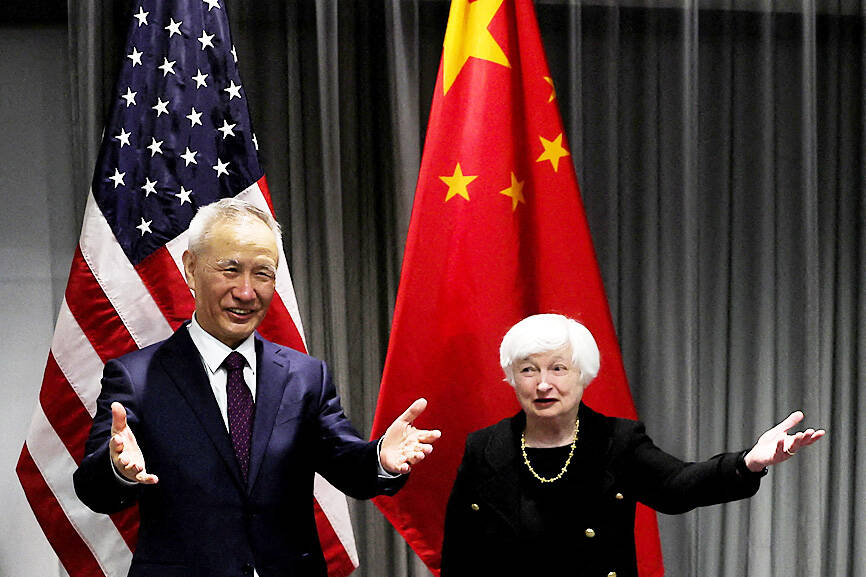US Secretary of the Treasury Janet Yellen is to travel to Beijing on Thursday as part of an ongoing effort to thaw US-China relations, a senior Us Department of the Treasury official said on Sunday.
Yellen, who has called the notion of an economic decoupling from China “disastrous,” has frequently said in the past year that she would like to visit China.
She says the two nations “can and need to find a way to live together” in spite of their strained relations over geopolitics and economic development.

Photo: Reuters
Yellen is to meet with Chinese officials and US companies doing business in China, and would stay until Sunday, said the official, who spoke on condition of anonymity to discuss details of the trip.
The goal of her visit is to deepen and increase the frequency of communication between the US and China, the official said.
While there are clear areas of common interest where Yellen can make progress, the official said, there are also significant disagreements that would not be resolved in a single trip.
The most recent flare-up came when US President Joe Biden referred to Chinese President Xi Jinping (習近平) as a “dictator” during a campaign fundraiser last month.
China protested loudly, but Biden later said his blunt statements regarding China are “just not something I’m going to change very much.”
The US president’s statements came after tensions over a Chinese surveillance balloon that the US government shot down, US-led restrictions on China’s access to advanced semiconductors and ongoing tensions about Taiwan.
Yellen’s trip would follow US Secretary of State Antony Blinken’s two-day stop in Beijing last month, the highest-level meetings in China in the past five years. Blinken met with Xi and the two agreed to stabilize deteriorated US-China ties, but better communications between their militaries could not be agreed upon.
US treasury officials did not specify which officials Yellen would meet, but said it would not be Xi.

A Chinese aircraft carrier group entered Japan’s economic waters over the weekend, before exiting to conduct drills involving fighter jets, the Japanese Ministry of Defense said yesterday. The Liaoning aircraft carrier, two missile destroyers and one fast combat supply ship sailed about 300km southwest of Japan’s easternmost island of Minamitori on Saturday, a ministry statement said. It was the first time a Chinese aircraft carrier had entered that part of Japan’s exclusive economic zone (EEZ), a ministry spokesman said. “We think the Chinese military is trying to improve its operational capability and ability to conduct operations in distant areas,” the spokesman said. China’s growing

Nine retired generals from Taiwan, Japan and the US have been invited to participate in a tabletop exercise hosted by the Taipei School of Economics and Political Science Foundation tomorrow and Wednesday that simulates a potential Chinese invasion of Taiwan in 2030, the foundation said yesterday. The five retired Taiwanese generals would include retired admiral Lee Hsi-min (李喜明), joined by retired US Navy admiral Michael Mullen and former chief of staff of the Japan Self-Defense Forces general Shigeru Iwasaki, it said. The simulation aims to offer strategic insights into regional security and peace in the Taiwan Strait, it added. Foundation chair Huang Huang-hsiung

PUBLIC WARNING: The two students had been tricked into going to Hong Kong for a ‘high-paying’ job, which sent them to a scam center in Cambodia Police warned the public not to trust job advertisements touting high pay abroad following the return of two college students over the weekend who had been trafficked and forced to work at a cyberscam center in Cambodia. The two victims, surnamed Lee (李), 18, and Lin (林), 19, were interviewed by police after landing in Taiwan on Saturday. Taichung’s Chingshui Police Precinct said in a statement yesterday that the two students are good friends, and Lin had suspended her studies after seeing the ad promising good pay to work in Hong Kong. Lee’s grandfather on Thursday reported to police that Lee had sent

BUILDUP: US General Dan Caine said Chinese military maneuvers are not routine exercises, but instead are ‘rehearsals for a forced unification’ with Taiwan China poses an increasingly aggressive threat to the US and deterring Beijing is the Pentagon’s top regional priority amid its rapid military buildup and invasion drills near Taiwan, US Secretary of Defense Pete Hegseth said on Tuesday. “Our pacing threat is communist China,” Hegseth told the US House of Representatives Appropriations Subcommittee on Defense during an oversight hearing with US General Dan Caine, chairman of the Joint Chiefs of Staff. “Beijing is preparing for war in the Indo-Pacific as part of its broader strategy to dominate that region and then the world,” Hegseth said, adding that if it succeeds, it could derail